
ProjectAirSim
Project AirSim is Microsoft's evolution of AirSim, an advanced simulation platform for building, training, and testing autonomous systems in high-fidelity virtual environments
Stars: 249
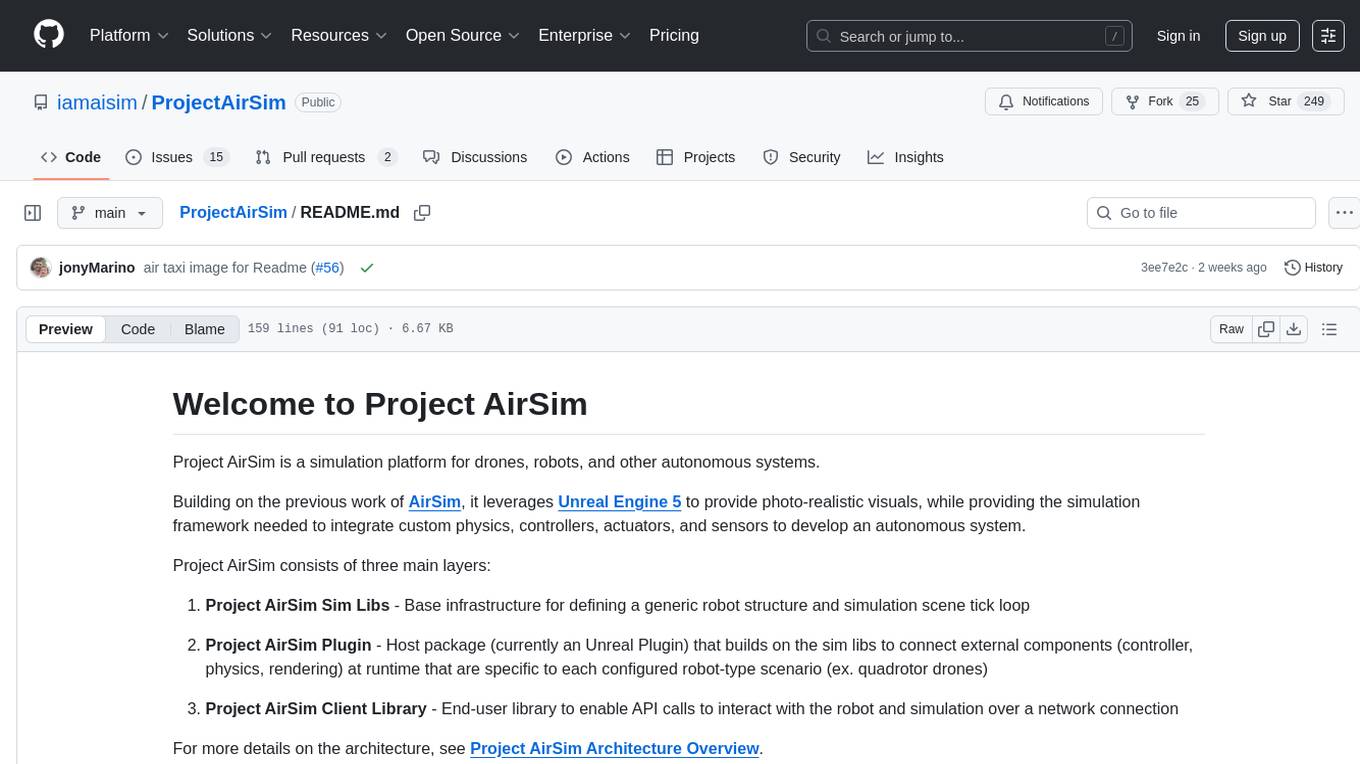
Project AirSim is a simulation platform for drones, robots, and autonomous systems. Leveraging Unreal Engine 5, it provides photo-realistic visuals and a simulation framework for custom physics, controllers, actuators, and sensors. It consists of three main layers: Sim Libs, Plugin, and Client Library. It supports Windows 11 and Ubuntu 22, inviting collaboration and enterprise support. Users can join the community, contribute to the roadmap, and get started with pre-built binaries or building from source. It offers headless running options and references for configuration settings, API, controllers, sensors, scene, physics, and FAQ.
README:
Project AirSim is a simulation platform for drones, robots, and other autonomous systems.
Building on the previous work of AirSim, it leverages Unreal Engine 5 to provide photo-realistic visuals, while providing the simulation framework needed to integrate custom physics, controllers, actuators, and sensors to develop an autonomous system.
Project AirSim consists of three main layers:
-
Project AirSim Sim Libs - Base infrastructure for defining a generic robot structure and simulation scene tick loop
-
Project AirSim Plugin - Host package (currently an Unreal Plugin) that builds on the sim libs to connect external components (controller, physics, rendering) at runtime that are specific to each configured robot-type scenario (ex. quadrotor drones)
-
Project AirSim Client Library - End-user library to enable API calls to interact with the robot and simulation over a network connection
For more details on the architecture, see Project AirSim Architecture Overview.
Project AirSim currently supports Windows 11 and Ubuntu 22. For more info about hardware specs for working with Project AirSim, see System Specifications.
We believe that open-source is the best way to foster innovation and collaboration in robotics simulation. Project AirSim can only thrive if it's built together — not by a single corporation, but by all of us.
We invite you to become part of this journey: contribute code, share feedback, report issues, and help shape the future of the platform.
IAMAI Simulations offers professional Enterprise Support for teams and organizations building on Project AirSim.
Whether you're working on large-scale simulations, custom features, or integration into your existing stack, we can help you move faster and with confidence.
To learn more, visit iamaisim.com.
Running and maintaining a project of this size has significant infrastructure and development costs. We are not Microsoft — we are a focused, passionate team. If you or your organization is benefiting from Project AirSim, please consider becoming a sponsor.
Your support helps us:
- Host and distribute binary releases
- Improve developer documentation and onboarding
- Offer community support and mentorship
- Push the platform forward with new features
To become a sponsor or partner, tap on the Sponsor button
We believe that collaboration is key to building a thriving ecosystem around Project AirSim. Join our growing community to share ideas, ask questions, and collaborate with other developers and enthusiasts:
- Discord: Connect with us on our official Discord server for real-time discussions, support, and updates. Join here.
- GitHub Discussions: Participate in discussions, share feedback, and contribute to shaping the future of Project AirSim. Start a discussion.
We look forward to hearing from you and building the future of autonomous systems together!
For a complete list of changes, view our Changelog.
Our project's roadmap and future direction are defined through GitHub issues and discussions. Issues or discussions labeled roadmap or need help outline planned features and areas where community contributions are encouraged. We invite you to participate and help shape the future of Project AirSim.
See Installing system prerequisites for information about Windows/Linux system setup needed before running Project AirSim.
I just want to download and run a Project AirSim environment and drive it with some Python code.
Note: You can either build Project AirSim from source or download pre-built binaries to use with the Python client.
I'm going to build the sim libs, Plugin, Blocks, and my own UE project environment from the ground up so I can customize it to my application.
If you need to run a Project AirSim simulation on a headless system, such as in a Docker container, you can enable off-screen rendering by adding the -RenderOffScreen argument when launching the Unreal environment executable:
Blocks{.exe/.sh} -RenderOffScreen
If you are running without GPU access and want to run without any image rendering, you can disable rendering completely by adding the -nullrhi argument:
Blocks{.exe/.sh} -nullrhi
These arguments can also be used while debugging in VS Code by modifying the launch.json file, or in Visual Studio 2022 by modifying the project's Configuration Properties. See Running Headless (Docker, Azure Cloud) for more details.
- Simulation Clock
- Coordinate System
- Weather Visual Effects
If you run into problems, check the FAQ for help.
See Transitioning from AirSim for guidance on converting an AirSim Unreal environment and client code from AirSim to Project AirSim.
Please see the License page for Project AirSim license information.
Copyright (C) Microsoft Corporation.
Copyright (C) 2025 IAMAI CONSULTING CORP
MIT License
For Tasks:
Click tags to check more tools for each tasksFor Jobs:
Alternative AI tools for ProjectAirSim
Similar Open Source Tools

ProjectAirSim
Project AirSim is a simulation platform for drones, robots, and autonomous systems. Leveraging Unreal Engine 5, it provides photo-realistic visuals and a simulation framework for custom physics, controllers, actuators, and sensors. It consists of three main layers: Sim Libs, Plugin, and Client Library. It supports Windows 11 and Ubuntu 22, inviting collaboration and enterprise support. Users can join the community, contribute to the roadmap, and get started with pre-built binaries or building from source. It offers headless running options and references for configuration settings, API, controllers, sensors, scene, physics, and FAQ.
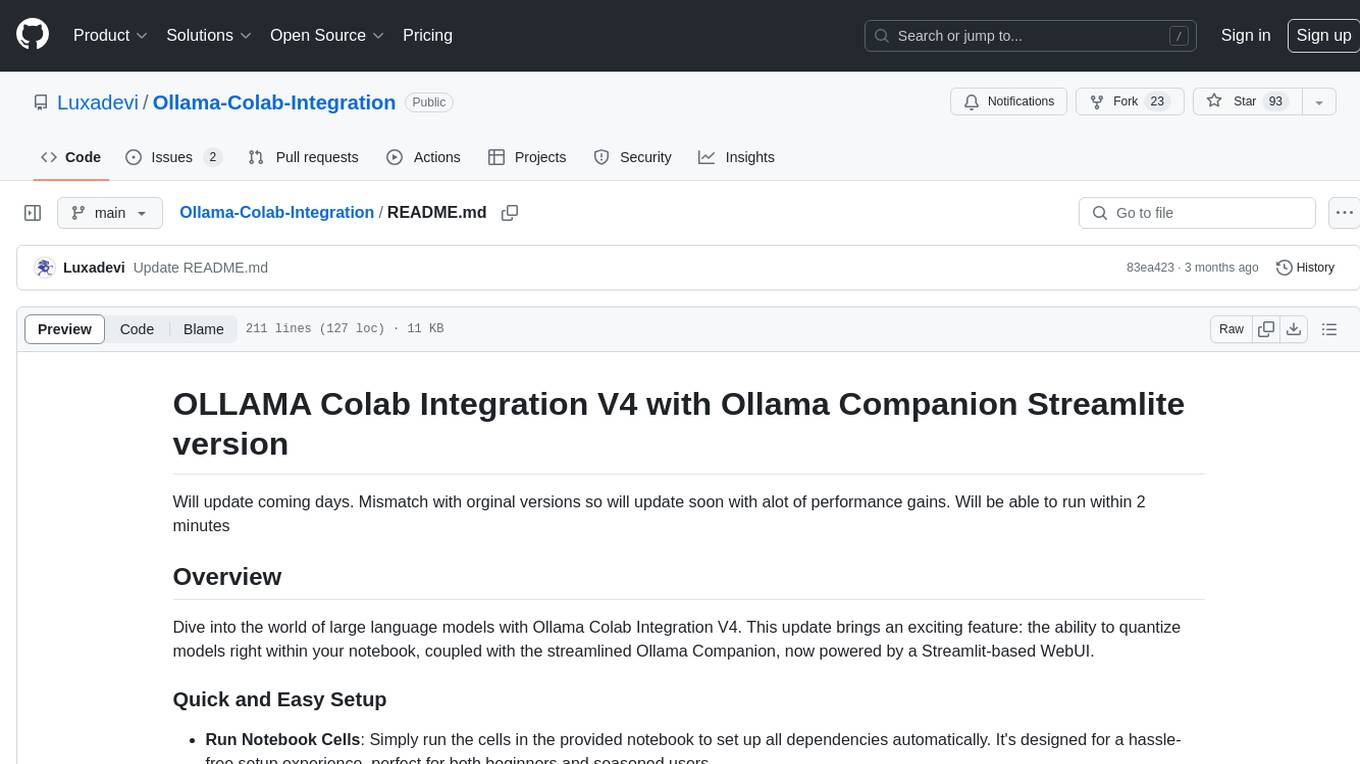
Ollama-Colab-Integration
Ollama Colab Integration V4 is a tool designed to enhance the interaction and management of large language models. It allows users to quantize models within their notebook environment, access a variety of models through a user-friendly interface, and manage public endpoints efficiently. The tool also provides features like LiteLLM proxy control, model insights, and customizable model file templating. Users can troubleshoot model loading issues, CPU fallback strategies, and manage VRAM and RAM effectively. Additionally, the tool offers functionalities for downloading model files from Hugging Face, model conversion with high precision, model quantization using Q and Kquants, and securely uploading converted models to Hugging Face.
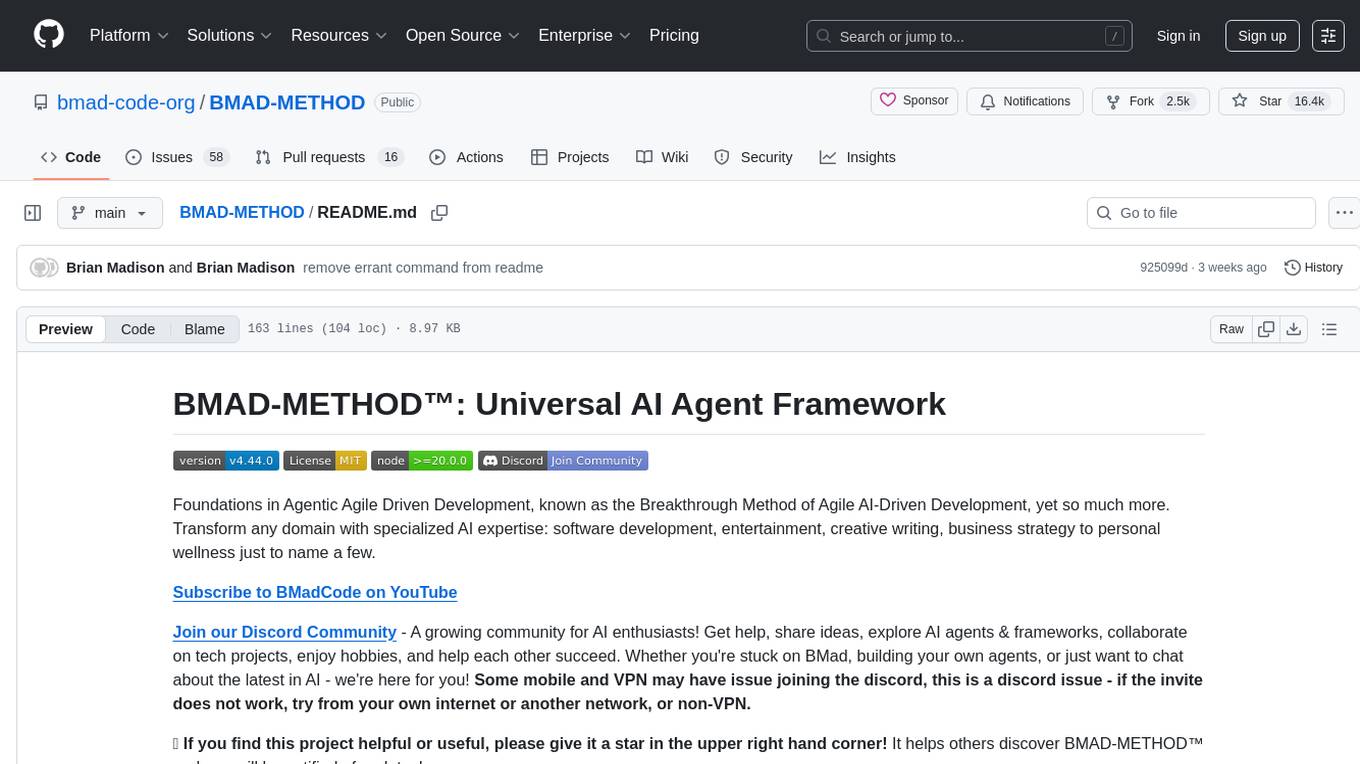
BMAD-METHOD
BMAD-METHOD™ is a universal AI agent framework that revolutionizes Agile AI-Driven Development. It offers specialized AI expertise across various domains, including software development, entertainment, creative writing, business strategy, and personal wellness. The framework introduces two key innovations: Agentic Planning, where dedicated agents collaborate to create detailed specifications, and Context-Engineered Development, which ensures complete understanding and guidance for developers. BMAD-METHOD™ simplifies the development process by eliminating planning inconsistency and context loss, providing a seamless workflow for creating AI agents and expanding functionality through expansion packs.

AgentForge
AgentForge is a low-code framework tailored for the rapid development, testing, and iteration of AI-powered autonomous agents and Cognitive Architectures. It is compatible with a range of LLM models and offers flexibility to run different models for different agents based on specific needs. The framework is designed for seamless extensibility and database-flexibility, making it an ideal playground for various AI projects. AgentForge is a beta-testing ground and future-proof hub for crafting intelligent, model-agnostic autonomous agents.
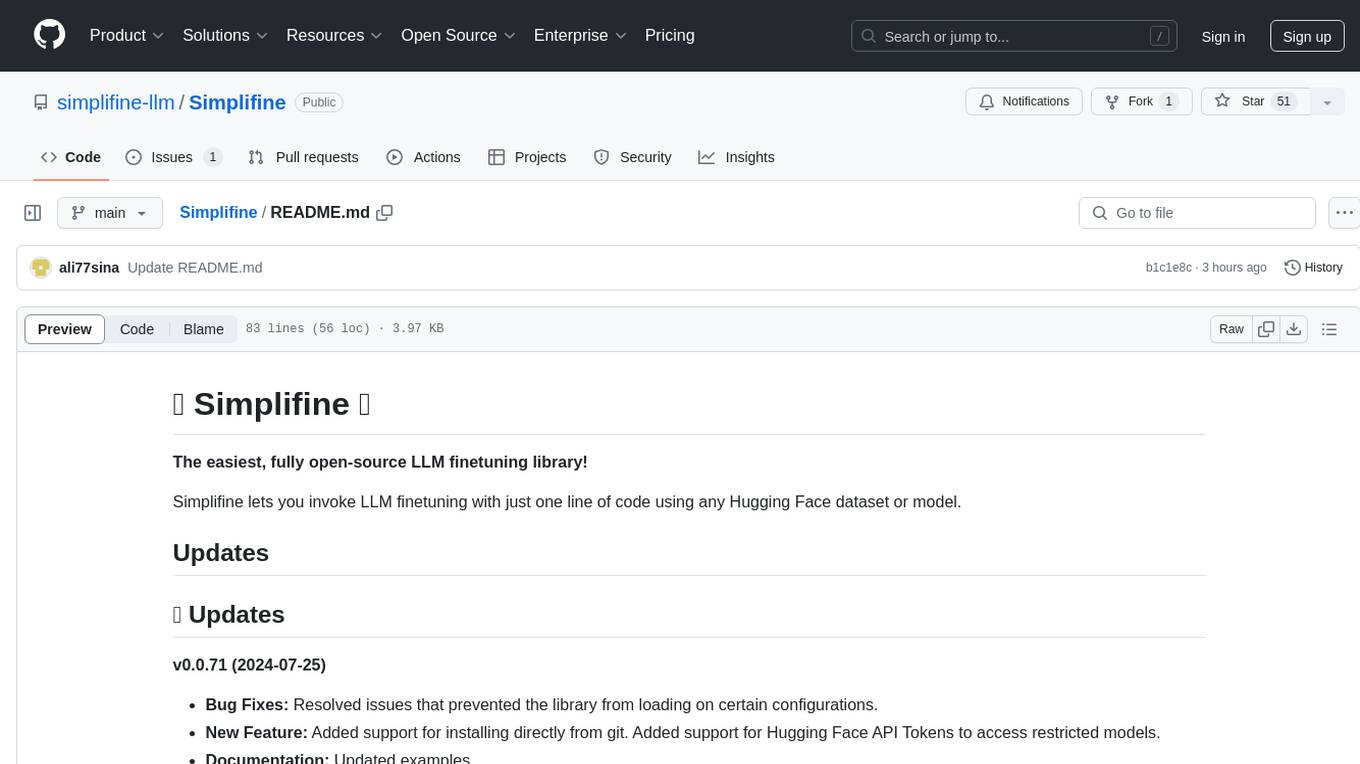
Simplifine
Simplifine is an open-source library designed for easy LLM finetuning, enabling users to perform tasks such as supervised fine tuning, question-answer finetuning, contrastive loss for embedding tasks, multi-label classification finetuning, and more. It provides features like WandB logging, in-built evaluation tools, automated finetuning parameters, and state-of-the-art optimization techniques. The library offers bug fixes, new features, and documentation updates in its latest version. Users can install Simplifine via pip or directly from GitHub. The project welcomes contributors and provides comprehensive documentation and support for users.
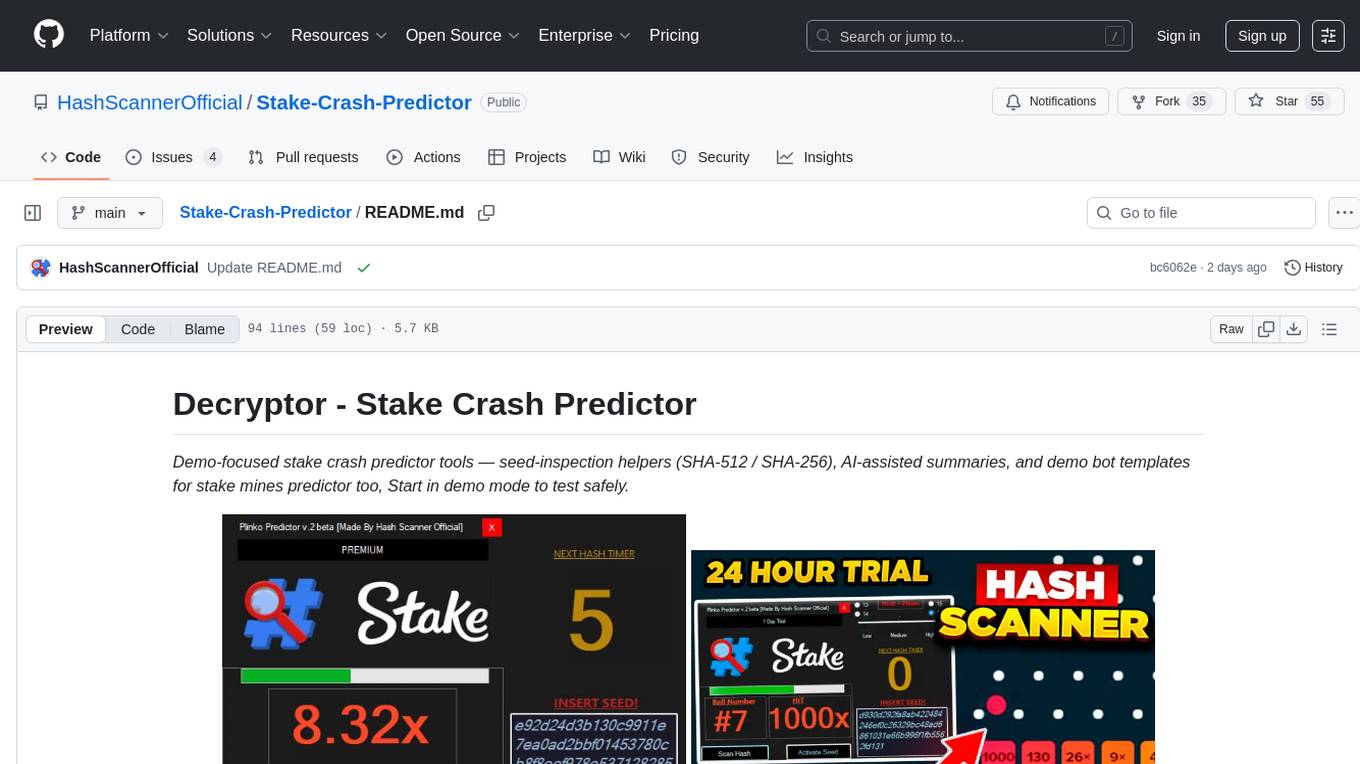
Stake-Crash-Predictor
The Stake Crash Predictor is a demo-focused toolkit that combines statistical analysis, decryption tools, and AI-assisted summaries to help users study rounds on Stake.us. It includes features like real-time prediction accuracy, AI summaries, decryption tools, and demo bot templates. Users can install the tool by downloading the ZIP file, run it in demo mode to explore crash predictor outputs, and use the server seed hash decrypt helper for educational purposes. The tool is designed for Stake.us and focuses on stake mines predictor and stake predictor workflows.
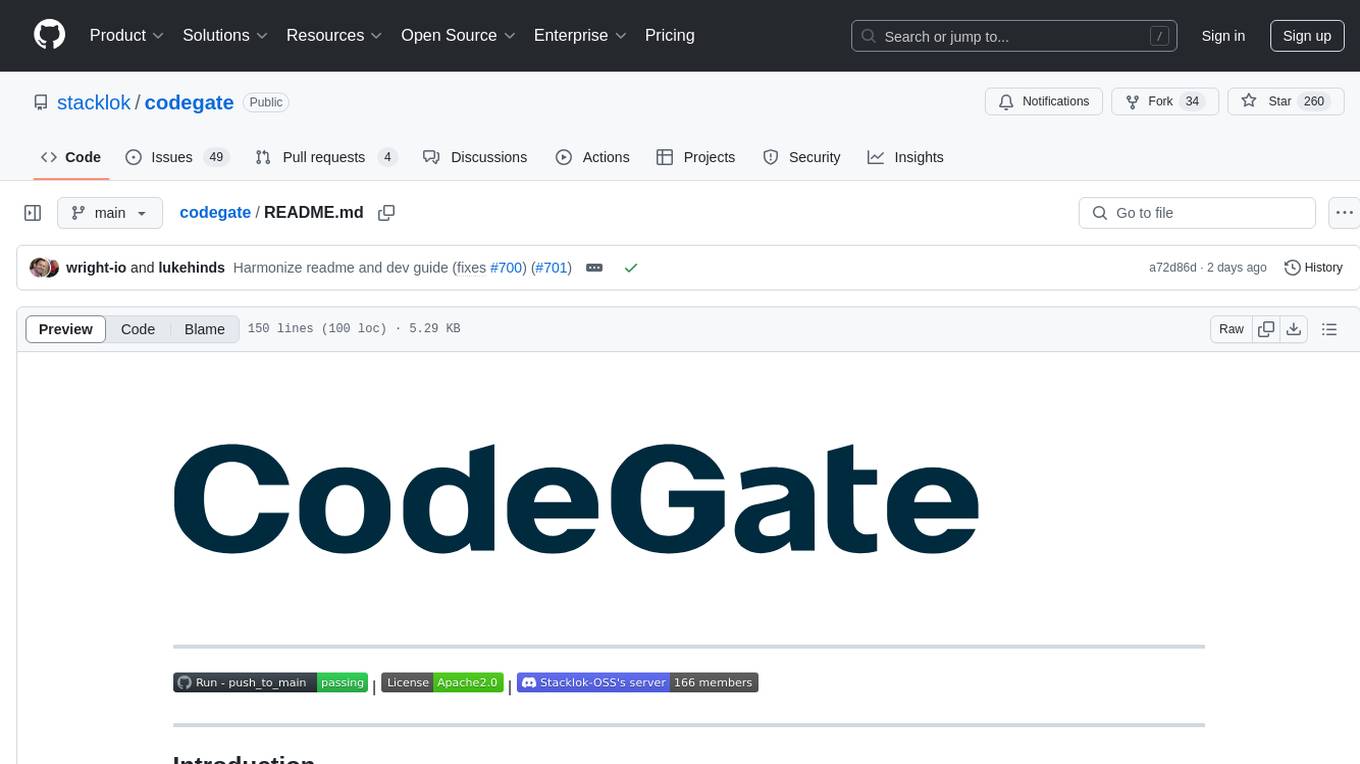
codegate
CodeGate is a local gateway that enhances the safety of AI coding assistants by ensuring AI-generated recommendations adhere to best practices, safeguarding code integrity, and protecting individual privacy. Developed by Stacklok, CodeGate allows users to confidently leverage AI in their development workflow without compromising security or productivity. It works seamlessly with coding assistants, providing real-time security analysis of AI suggestions. CodeGate is designed with privacy at its core, keeping all data on the user's machine and offering complete control over data.
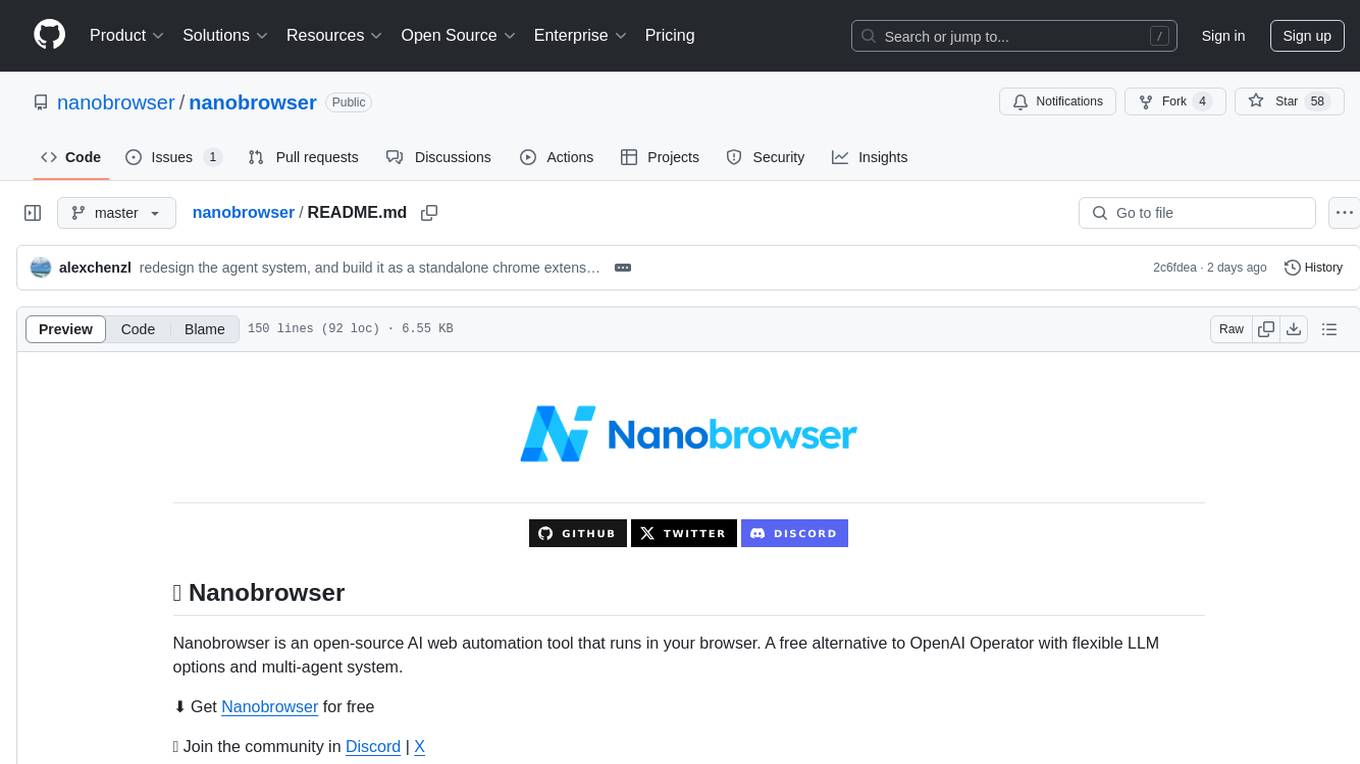
nanobrowser
Nanobrowser is an open-source AI web automation tool that runs in your browser. It is a free alternative to OpenAI Operator with flexible LLM options and a multi-agent system. Nanobrowser offers premium web automation capabilities while keeping users in complete control, with features like a multi-agent system, interactive side panel, task automation, follow-up questions, and multiple LLM support. Users can easily download and install Nanobrowser as a Chrome extension, configure agent models, and accomplish tasks such as news summary, GitHub research, and shopping research with just a sentence. The tool uses a specialized multi-agent system powered by large language models to understand and execute complex web tasks. Nanobrowser is actively developed with plans to expand LLM support, implement security measures, optimize memory usage, enable session replay, and develop specialized agents for domain-specific tasks. Contributions from the community are welcome to improve Nanobrowser and build the future of web automation.
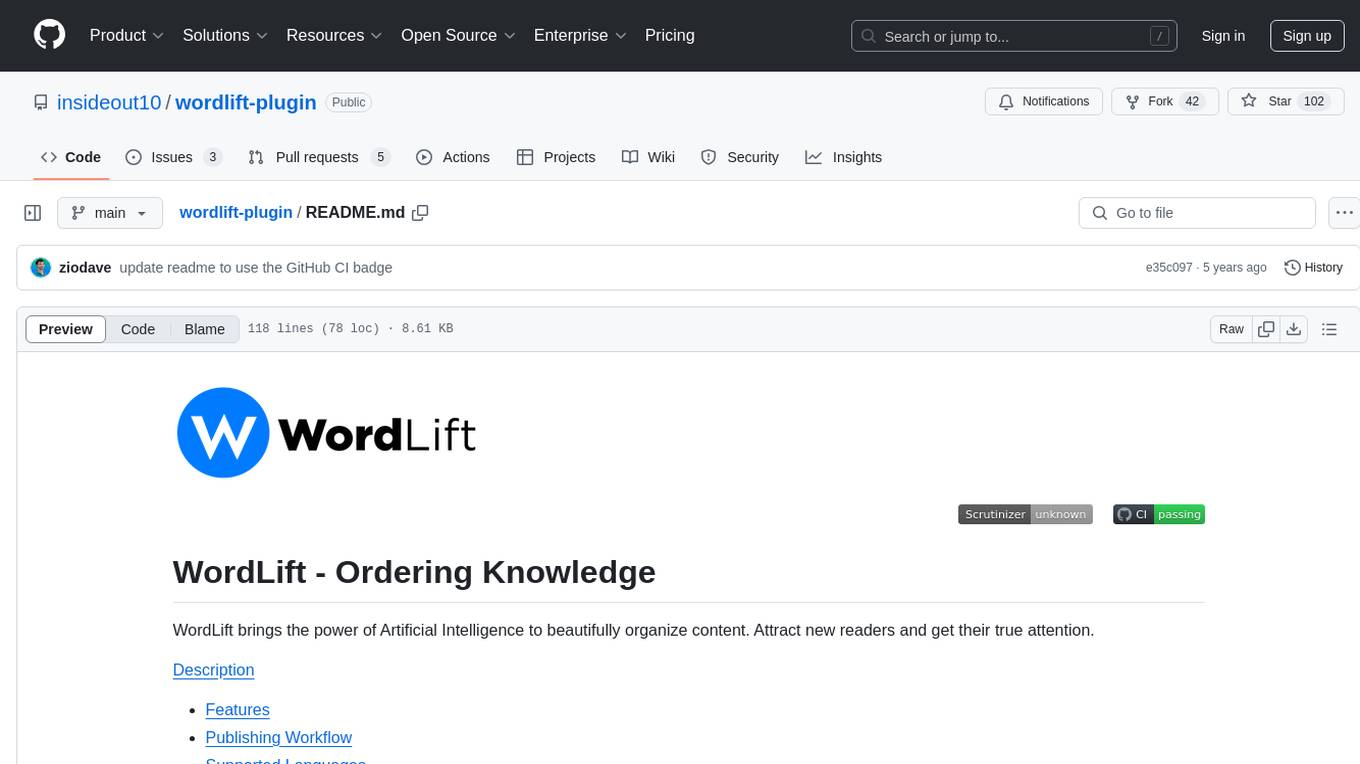
wordlift-plugin
WordLift is a plugin that helps online content creators organize posts and pages by adding facts, links, and media to build beautifully structured websites for both humans and search engines. It allows users to create, own, and publish their own knowledge graph, and publishes content as Linked Open Data following Tim Berners-Lee's Linked Data Principles. The plugin supports writers by providing trustworthy and contextual facts, enriching content with images, links, and interactive visualizations, keeping readers engaged with relevant content recommendations, and producing content compatible with schema.org markup for better indexing and display on search engines. It also offers features like creating a personal Wikipedia, publishing metadata to share and distribute content, and supporting content tagging for better SEO.
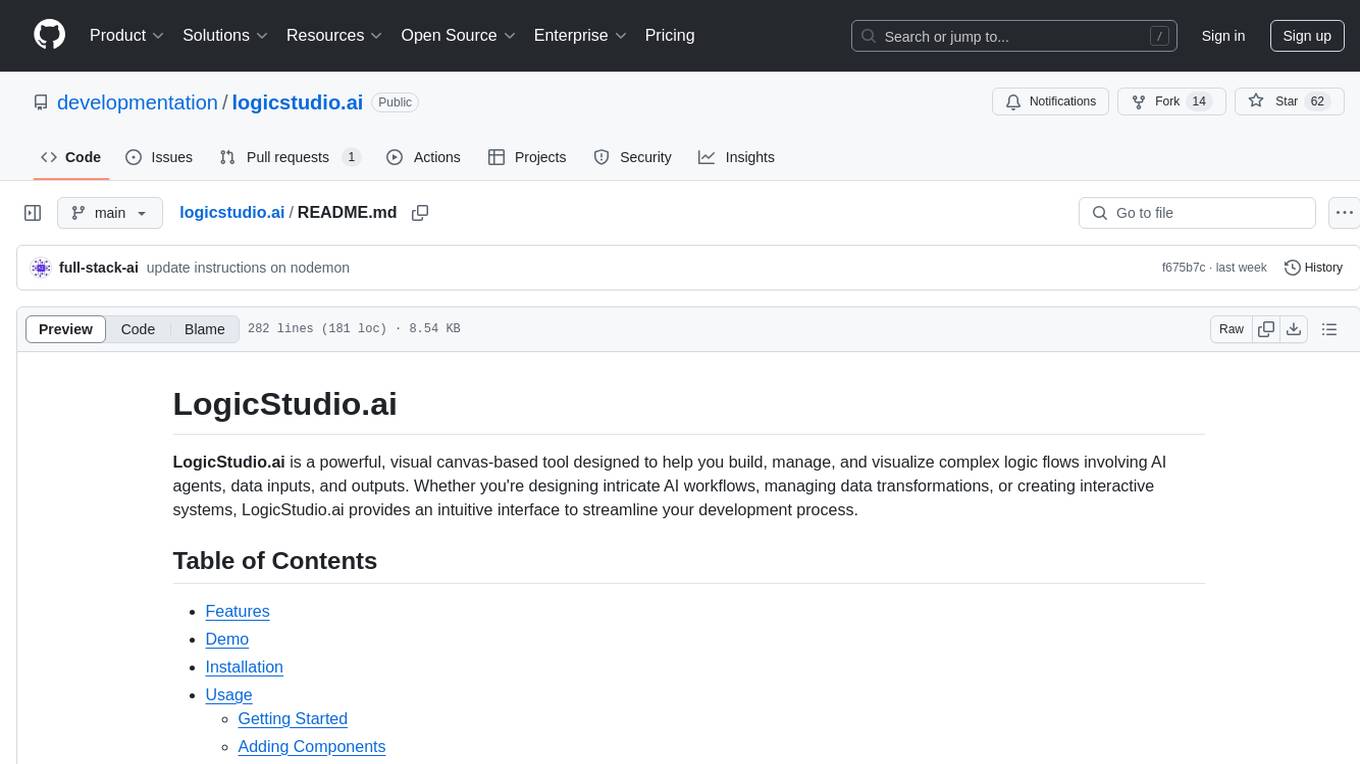
logicstudio.ai
LogicStudio.ai is a powerful visual canvas-based tool for building, managing, and visualizing complex logic flows involving AI agents, data inputs, and outputs. It provides an intuitive interface to streamline development processes by offering features like drag-and-drop canvas design, dynamic components, real-time connections, import/export capabilities, zoom & pan controls, file management, AI integration, editable views, and various output formats. Users can easily add, connect, configure, and manage components to create interactive systems and workflows.
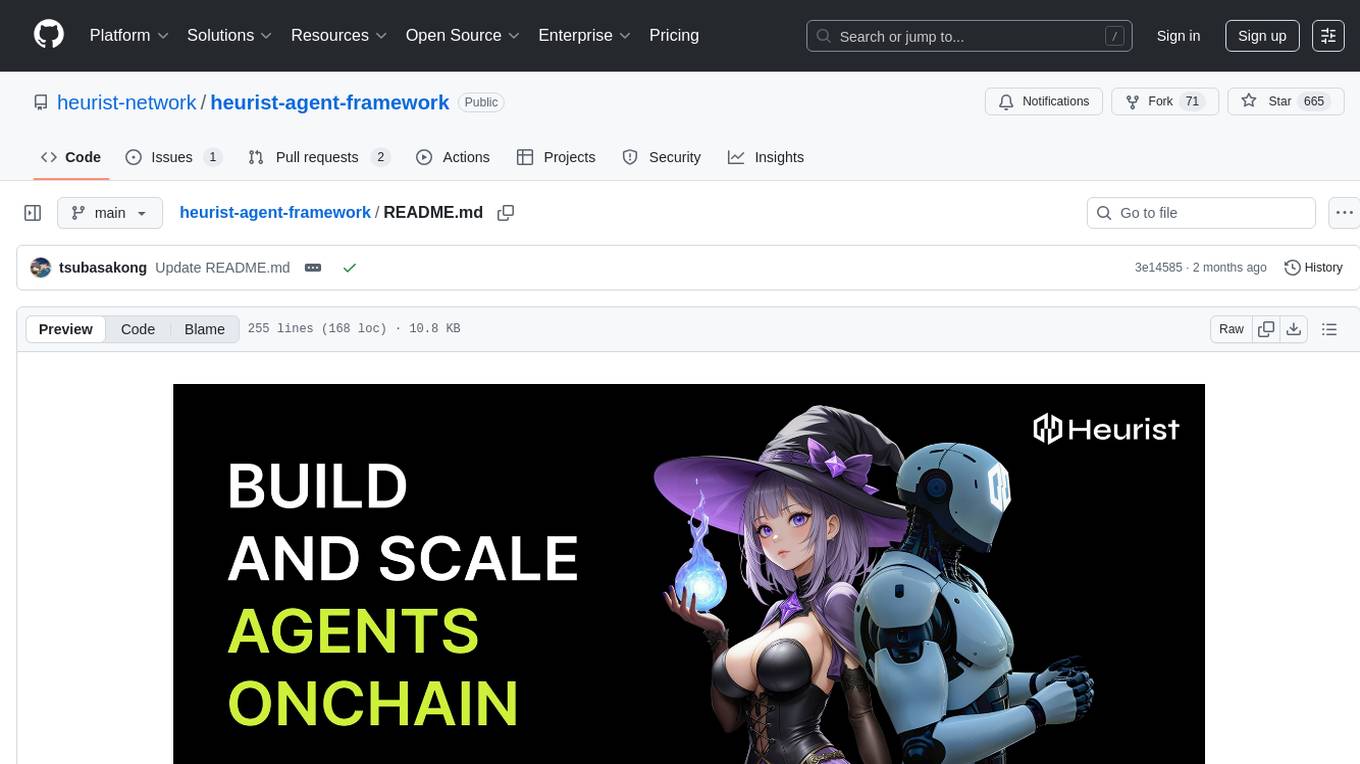
heurist-agent-framework
Heurist Agent Framework is a flexible multi-interface AI agent framework that allows processing text and voice messages, generating images and videos, interacting across multiple platforms, fetching and storing information in a knowledge base, accessing external APIs and tools, and composing complex workflows using Mesh Agents. It supports various platforms like Telegram, Discord, Twitter, Farcaster, REST API, and MCP. The framework is built on a modular architecture and provides core components, tools, workflows, and tool integration with MCP support.
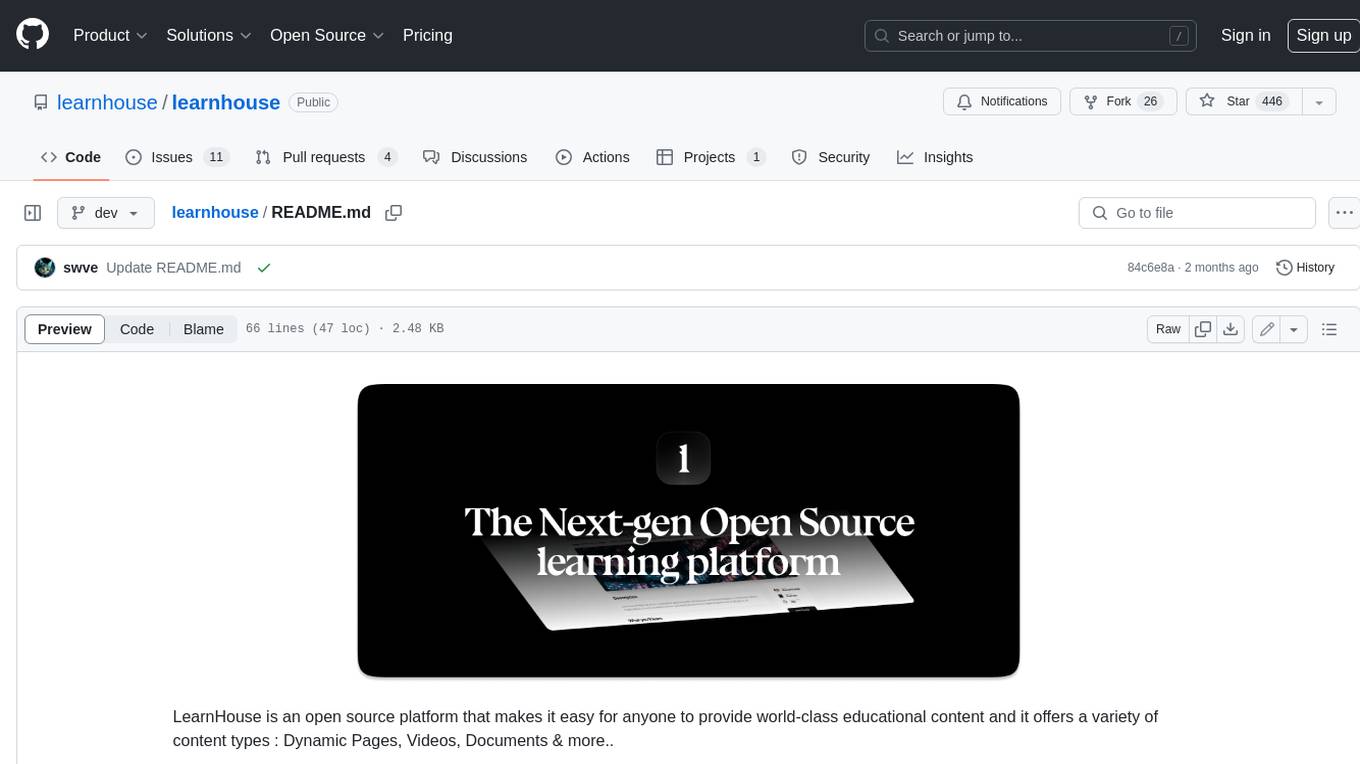
learnhouse
LearnHouse is an open-source platform that allows anyone to easily provide world-class educational content. It supports various content types, including dynamic pages, videos, and documents. The platform is still in early development and should not be used in production environments. However, it offers several features, such as dynamic Notion-like pages, ease of use, multi-organization support, support for uploading videos and documents, course collections, user management, quizzes, course progress tracking, and an AI-powered assistant for teachers and students. LearnHouse is built using various open-source projects, including Next.js, TailwindCSS, Radix UI, Tiptap, FastAPI, YJS, PostgreSQL, LangChain, and React.
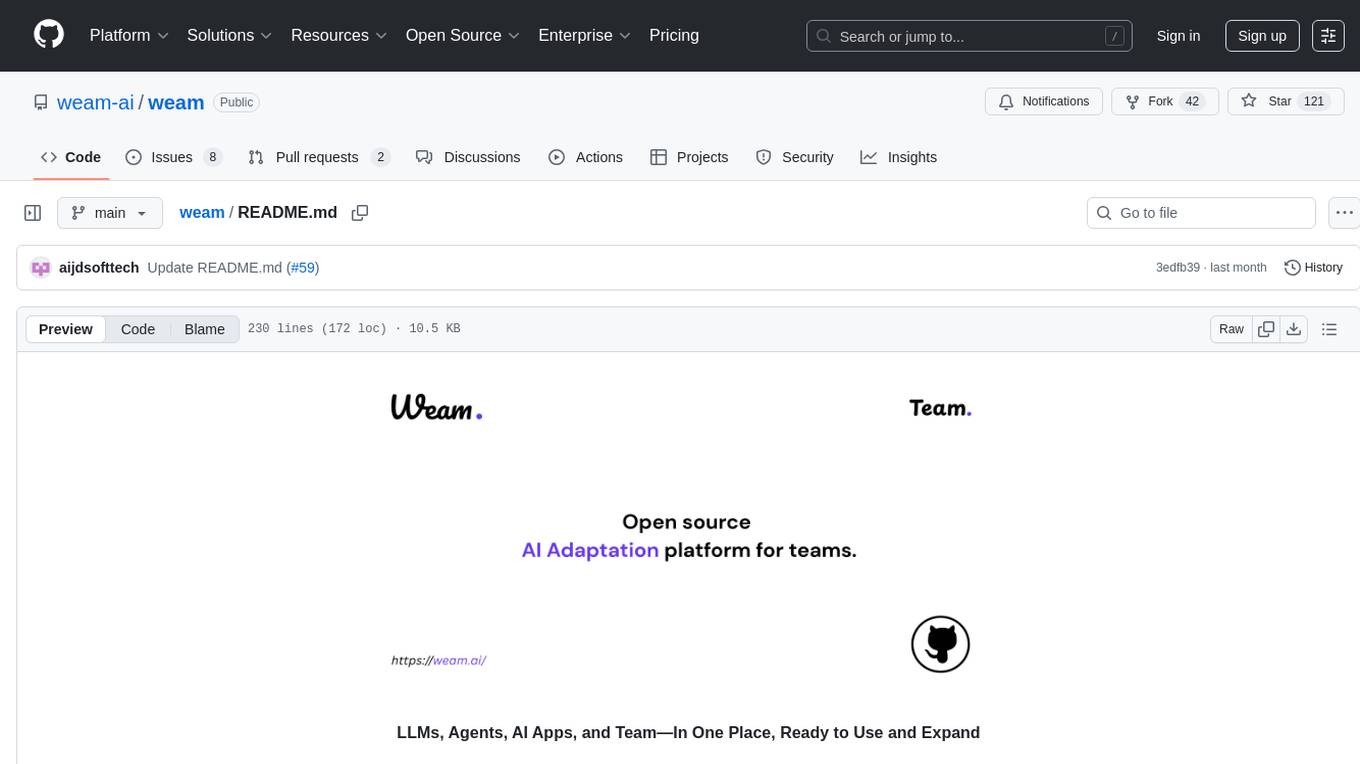
weam
Weam is an open source platform designed to help teams systematically adopt AI. It provides a production-ready stack with Next.js frontend and Node.js/Python backend, allowing for immediate deployment and use. Weam connects to major LLM providers, enabling easy access to the latest AI models. The platform organizes AI interactions into 'Brains' for different departments, offering customization and expansion options. Features include chat system, productivity tools, sharing & access controls, prompt library, AI agents, RAG, MCP, enterprise features, pre-built automations, and upcoming AI app solutions. Weam is free, open source, and scalable to meet growing needs.
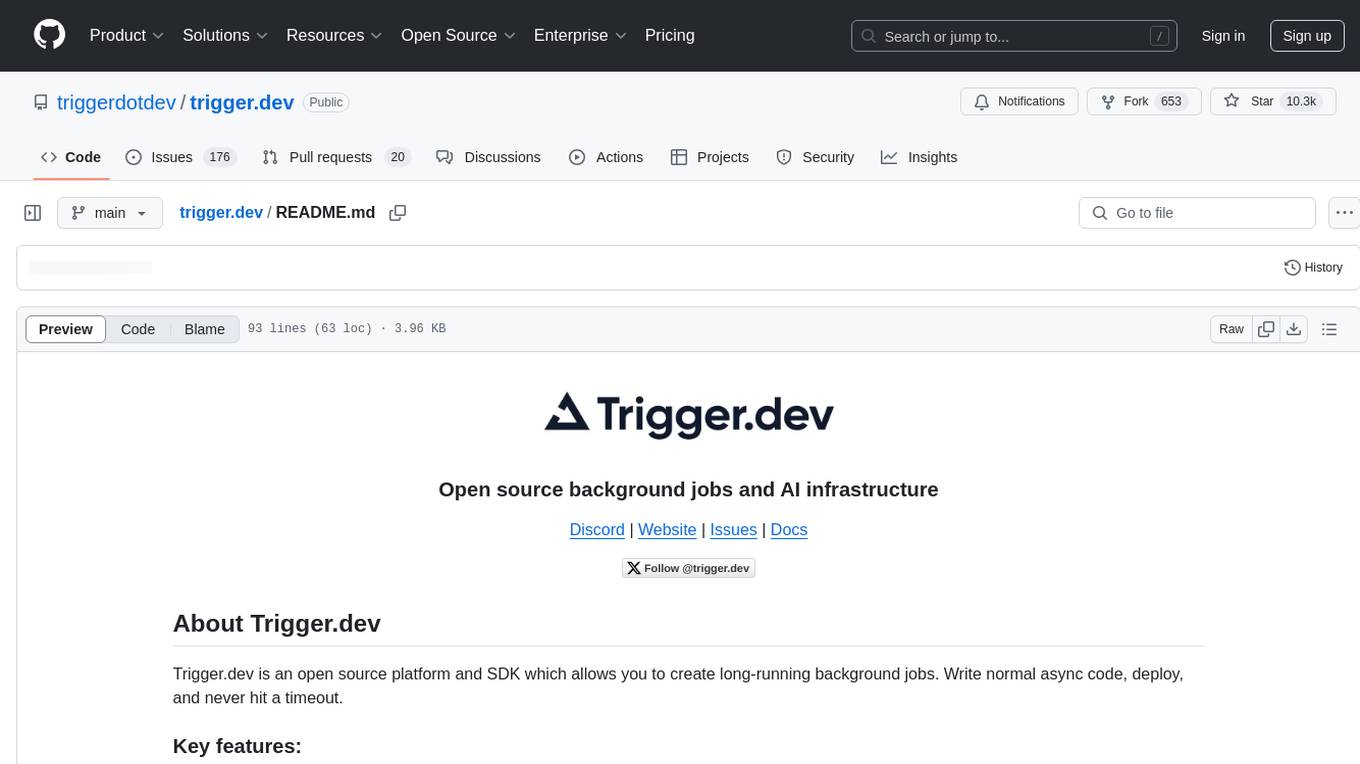
trigger.dev
Trigger.dev is an open source platform and SDK for creating long-running background jobs. It provides features like JavaScript and TypeScript SDK, no timeouts, retries, queues, schedules, observability, React hooks, Realtime API, custom alerts, elastic scaling, and works with existing tech stack. Users can create tasks in their codebase, deploy tasks using the SDK, manage tasks in different environments, and have full visibility of job runs. The platform offers a trace view of every task run for detailed monitoring. Getting started is easy with account creation, project setup, and onboarding instructions. Self-hosting and development guides are available for users interested in contributing or hosting Trigger.dev.
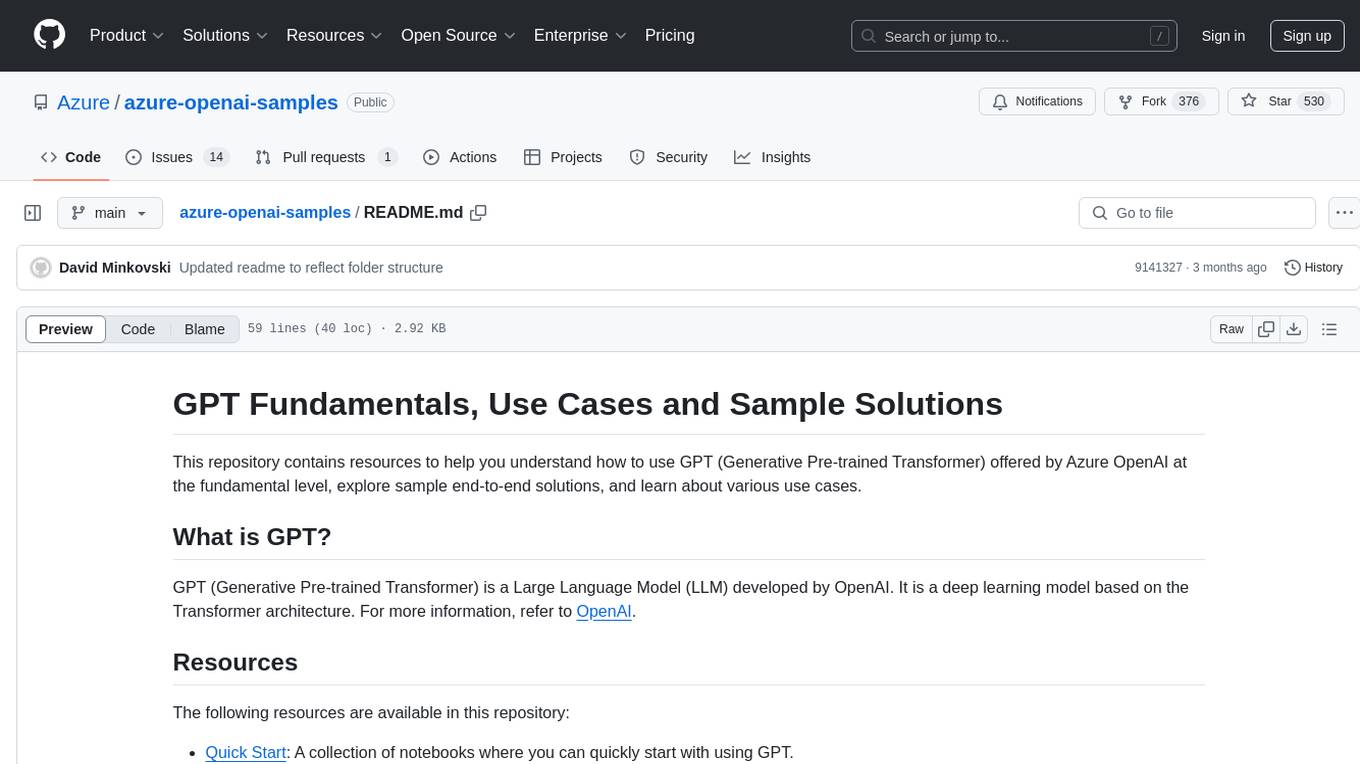
azure-openai-samples
This repository provides resources to understand and utilize GPT (Generative Pre-trained Transformer) by Azure OpenAI. It includes sample solutions, use cases, and quick start guides. Users can explore various applications of GPT, such as chatbots, customer service, and content generation. The repository also offers Langchain, Semantic Kernel, and Prompt Flow samples, along with Serverless SQL GPT for natural language processing in Azure Synapse Analytics. The samples are based on GPT 3.5, with plans to update for GPT-4. Users are encouraged to contribute to keep the repository updated with the latest technologies and solutions.

ChatFAQ
ChatFAQ is an open-source comprehensive platform for creating a wide variety of chatbots: generic ones, business-trained, or even capable of redirecting requests to human operators. It includes a specialized NLP/NLG engine based on a RAG architecture and customized chat widgets, ensuring a tailored experience for users and avoiding vendor lock-in.
For similar tasks

ProjectAirSim
Project AirSim is a simulation platform for drones, robots, and autonomous systems. Leveraging Unreal Engine 5, it provides photo-realistic visuals and a simulation framework for custom physics, controllers, actuators, and sensors. It consists of three main layers: Sim Libs, Plugin, and Client Library. It supports Windows 11 and Ubuntu 22, inviting collaboration and enterprise support. Users can join the community, contribute to the roadmap, and get started with pre-built binaries or building from source. It offers headless running options and references for configuration settings, API, controllers, sensors, scene, physics, and FAQ.
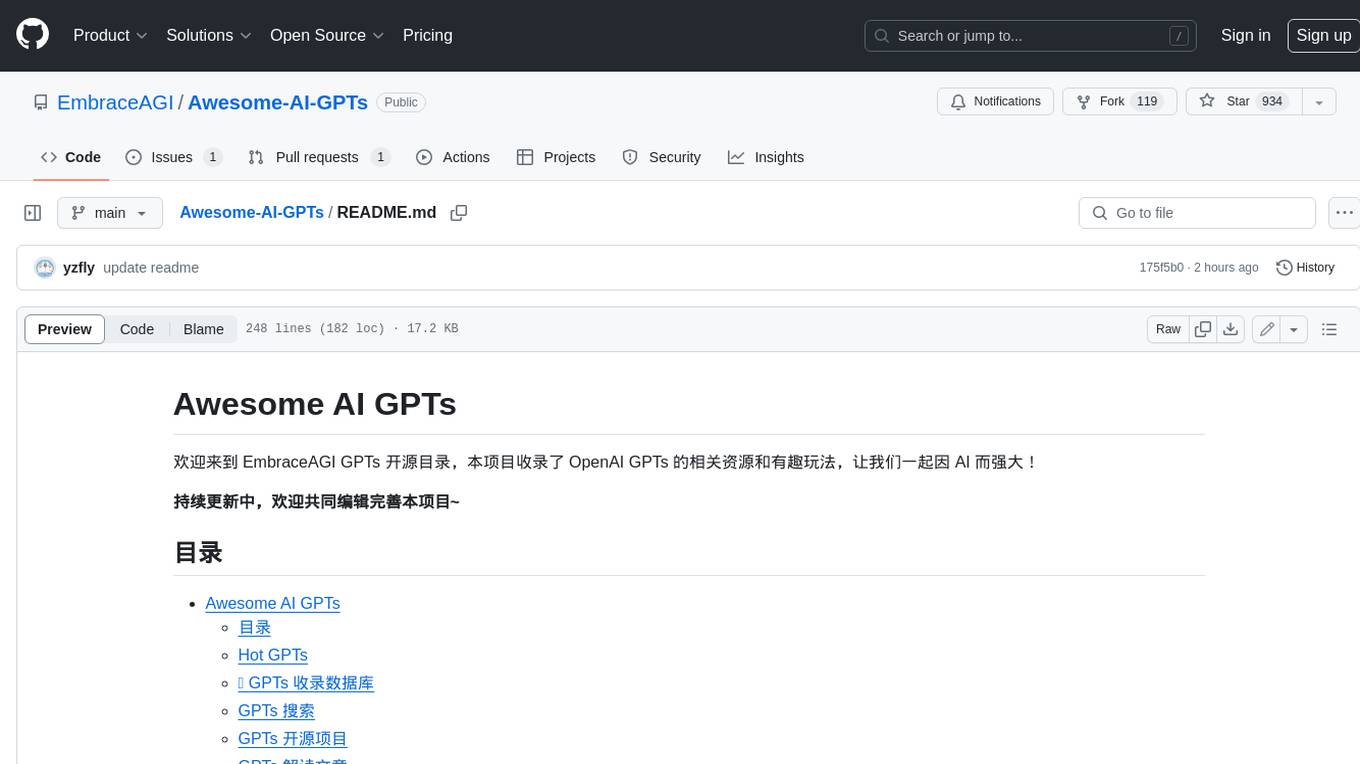
Awesome-AI-GPTs
Awesome AI GPTs is an open repository that collects resources and fun ways to use OpenAI GPTs. It includes databases, search tools, open-source projects, articles, attack and defense strategies, installation of custom plugins, knowledge bases, and community interactions related to GPTs. Users can find curated lists, leaked prompts, and various GPT applications in this repository. The project aims to empower users with AI capabilities and foster collaboration in the AI community.
For similar jobs
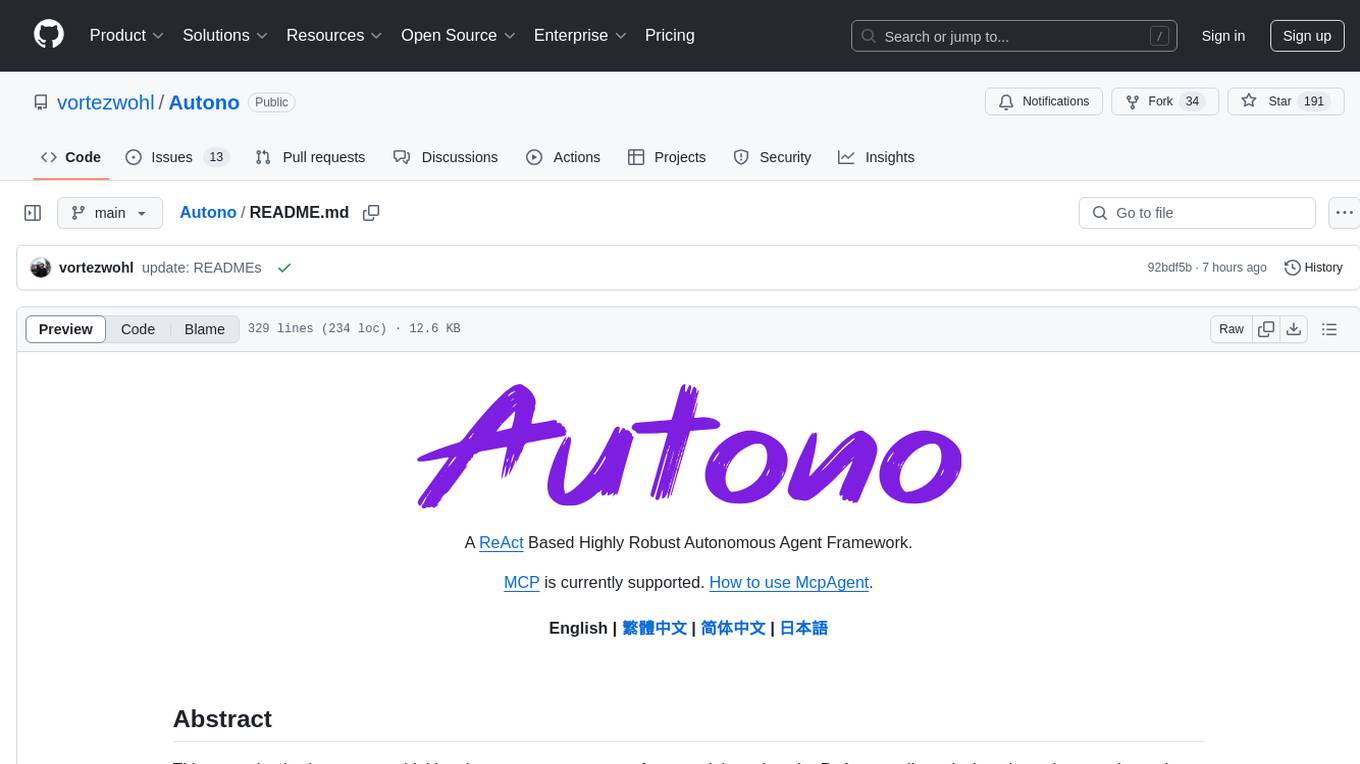
Autono
A highly robust autonomous agent framework based on the ReAct paradigm, designed for adaptive decision making and multi-agent collaboration. It dynamically generates next actions during agent execution, enhancing robustness. Features a timely abandonment strategy and memory transfer mechanism for multi-agent collaboration. The framework allows developers to balance conservative and exploratory tendencies in agent execution strategies, improving adaptability and task execution efficiency in complex environments. Supports external tool integration, modular design, and MCP protocol compatibility for flexible action space expansion. Multi-agent collaboration mechanism enables agents to focus on specific task components, improving execution efficiency and quality.

ProjectAirSim
Project AirSim is a simulation platform for drones, robots, and autonomous systems. Leveraging Unreal Engine 5, it provides photo-realistic visuals and a simulation framework for custom physics, controllers, actuators, and sensors. It consists of three main layers: Sim Libs, Plugin, and Client Library. It supports Windows 11 and Ubuntu 22, inviting collaboration and enterprise support. Users can join the community, contribute to the roadmap, and get started with pre-built binaries or building from source. It offers headless running options and references for configuration settings, API, controllers, sensors, scene, physics, and FAQ.
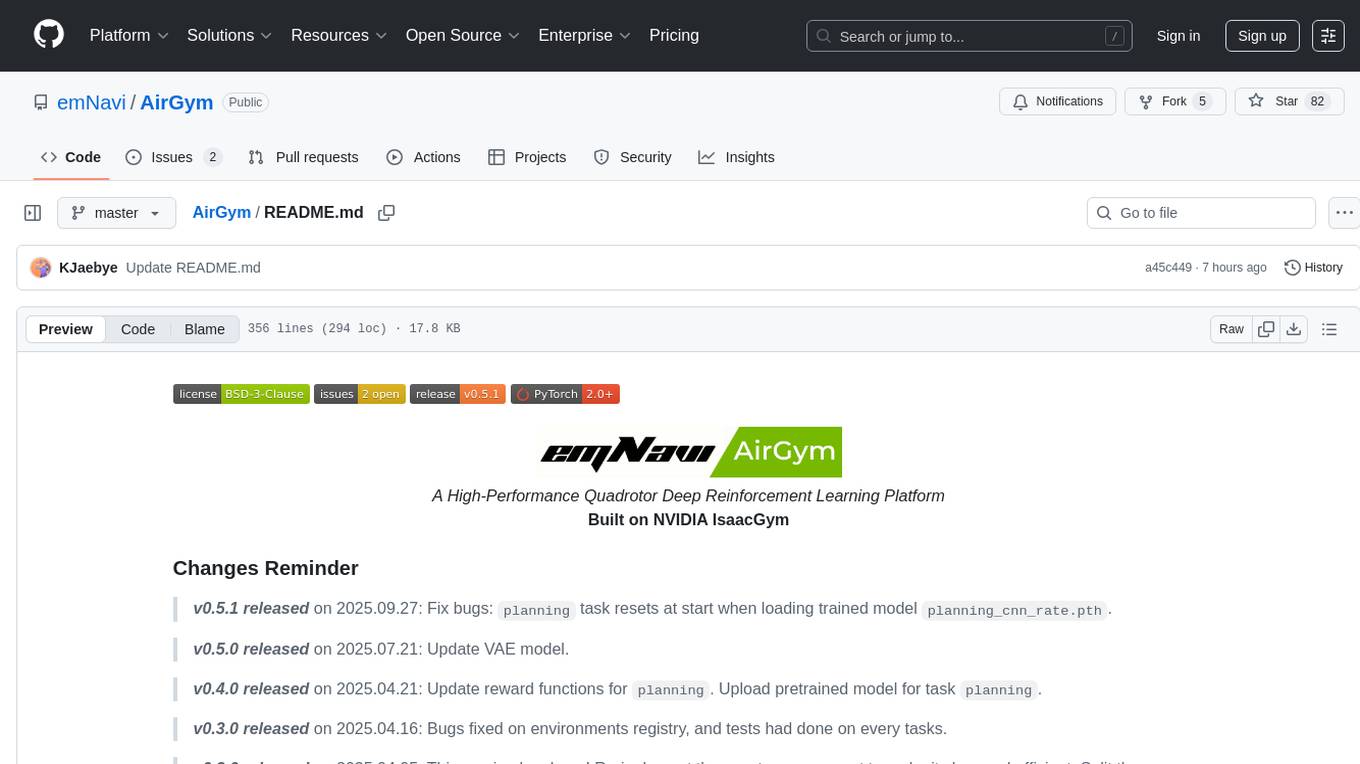
AirGym
AirGym is an open source Python quadrotor simulator based on IsaacGym, providing a high-fidelity dynamics and Deep Reinforcement Learning (DRL) framework for quadrotor robot learning research. It offers a lightweight and customizable platform with strict alignment with PX4 logic, multiple control modes, and Sim-to-Real toolkits. Users can perform tasks such as Hovering, Balloon, Tracking, Avoid, and Planning, with the ability to create customized environments and tasks. The tool also supports training from scratch, visual encoding approaches, playing and testing of trained models, and customization of new tasks and assets.
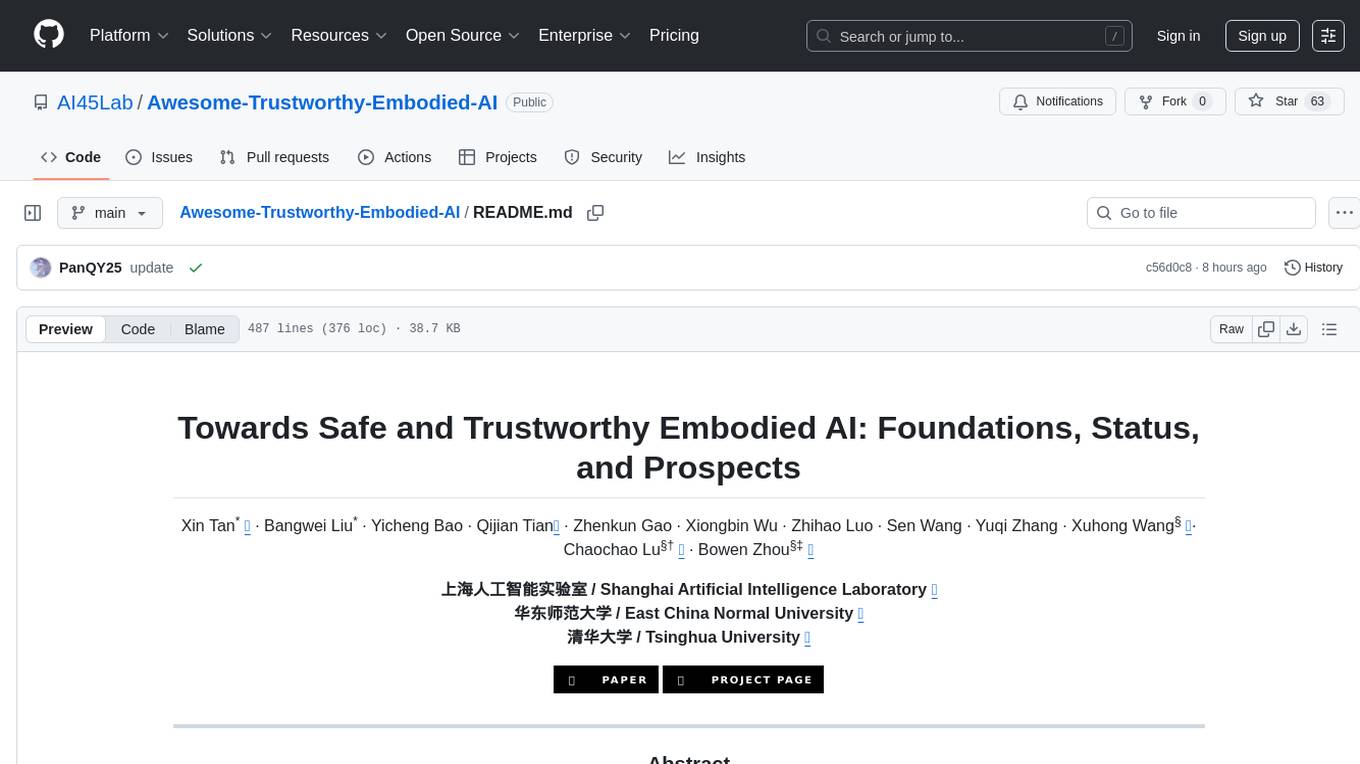
Awesome-Trustworthy-Embodied-AI
The Awesome Trustworthy Embodied AI repository focuses on the development of safe and trustworthy Embodied Artificial Intelligence (EAI) systems. It addresses critical challenges related to safety and trustworthiness in EAI, proposing a unified research framework and defining levels of safety and resilience. The repository provides a comprehensive review of state-of-the-art solutions, benchmarks, and evaluation metrics, aiming to bridge the gap between capability advancement and safety mechanisms in EAI development.
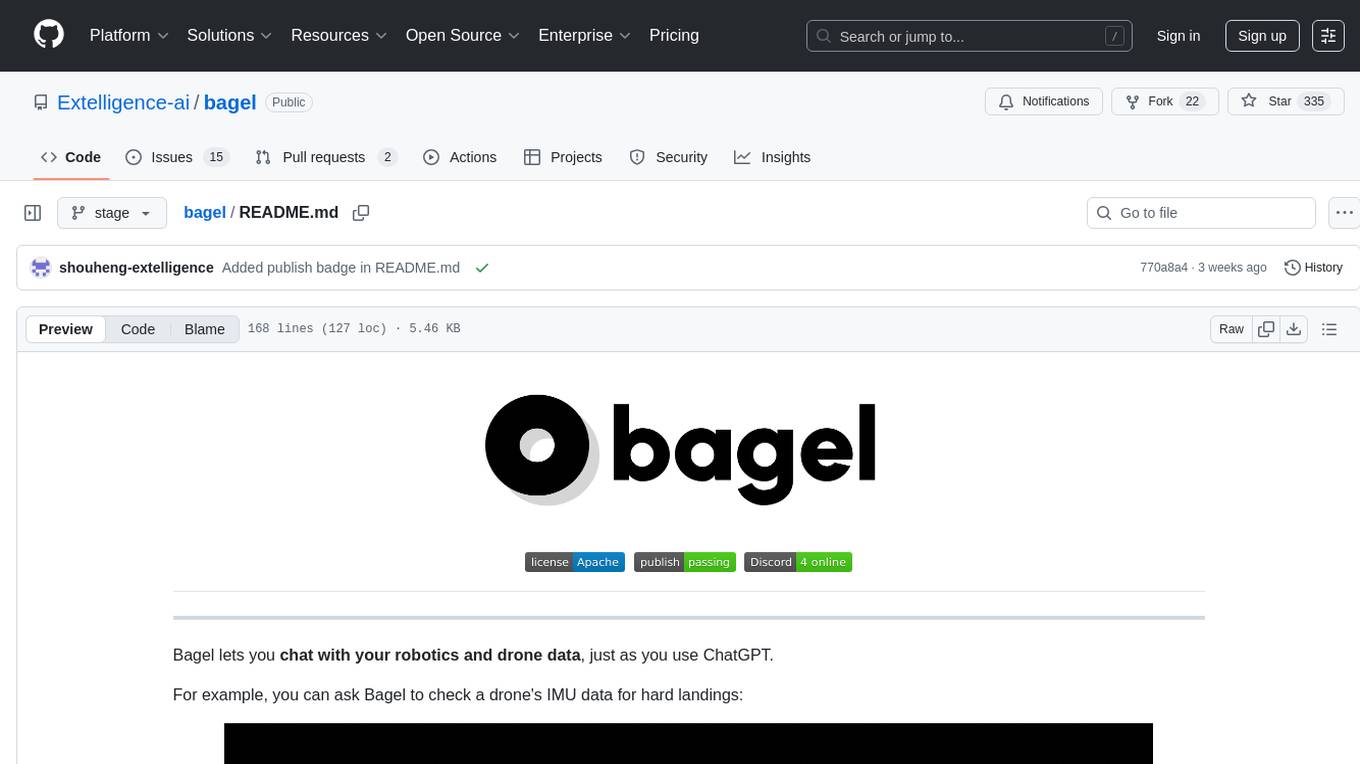
bagel
Bagel is a tool that allows users to chat with their robotics and drone data similar to using ChatGPT. It generates deterministic and auditable DuckDB SQL queries to analyze data, supporting various robotics and sensor log formats. Users can interact with Bagel through a Discord server, and it can be integrated with different language models. Bagel provides tutorials, Docker images for easy deployment, and a roadmap for upcoming features like Computer Vision Module, Anomaly Detection, and more.

spear
SPEAR (Simulator for Photorealistic Embodied AI Research) is a powerful tool for training embodied agents. It features 300 unique virtual indoor environments with 2,566 unique rooms and 17,234 unique objects that can be manipulated individually. Each environment is designed by a professional artist and features detailed geometry, photorealistic materials, and a unique floor plan and object layout. SPEAR is implemented as Unreal Engine assets and provides an OpenAI Gym interface for interacting with the environments via Python.
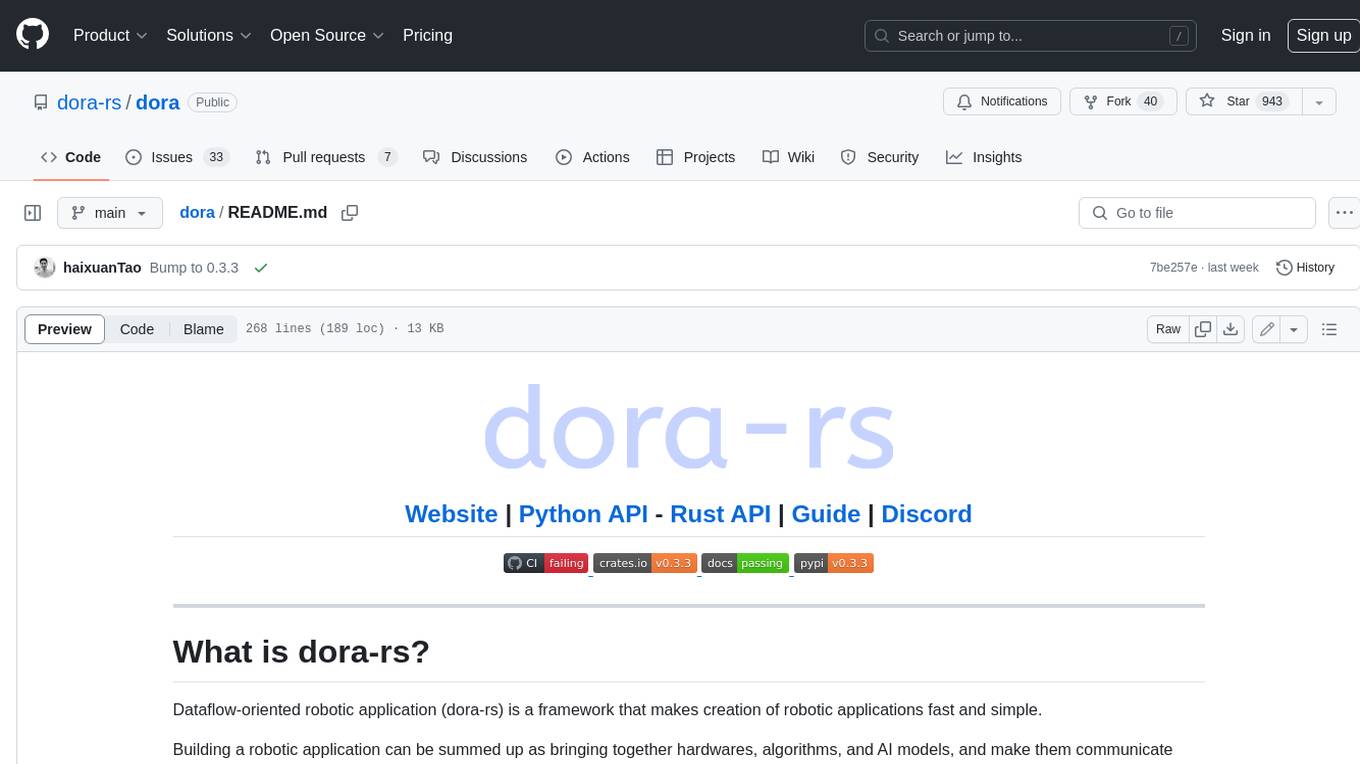
dora
Dataflow-oriented robotic application (dora-rs) is a framework that makes creation of robotic applications fast and simple. Building a robotic application can be summed up as bringing together hardwares, algorithms, and AI models, and make them communicate with each others. At dora-rs, we try to: make integration of hardware and software easy by supporting Python, C, C++, and also ROS2. make communication low latency by using zero-copy Arrow messages. dora-rs is still experimental and you might experience bugs, but we're working very hard to make it stable as possible.
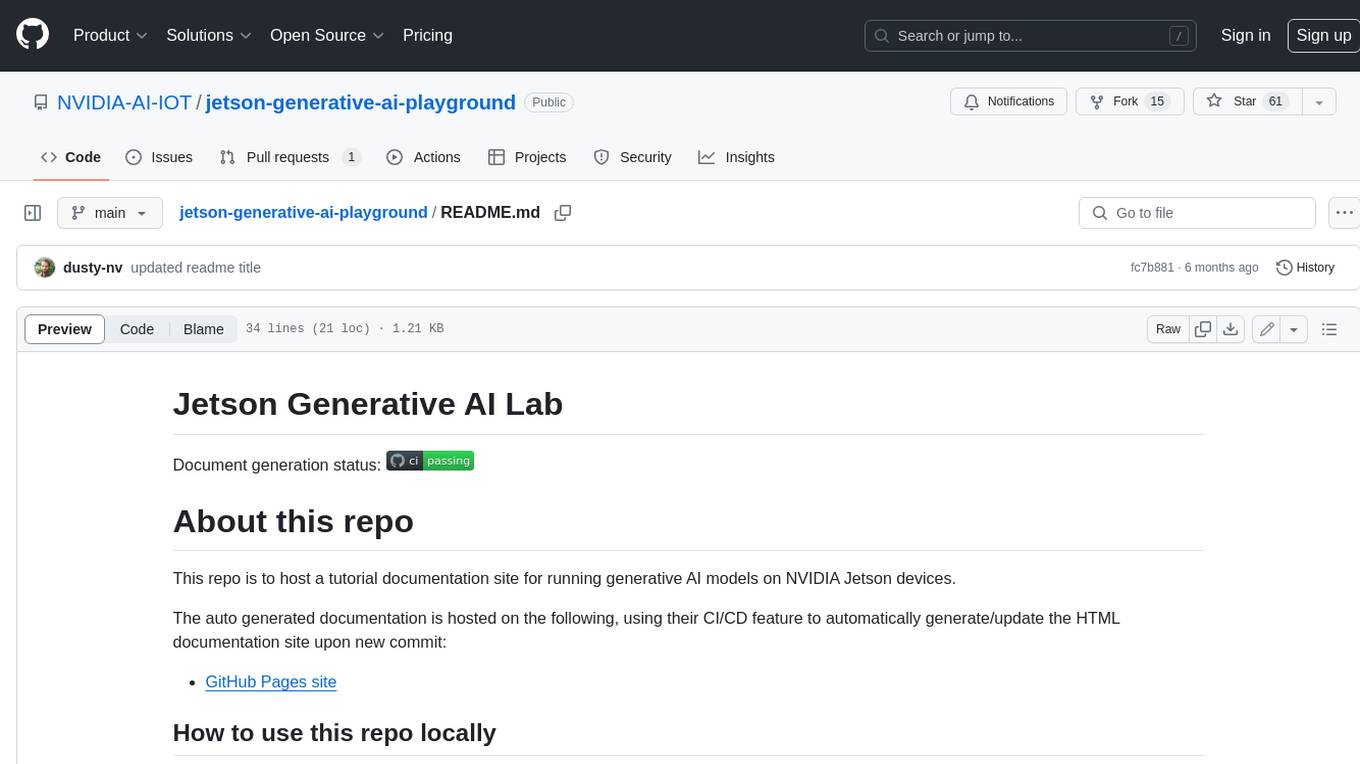
jetson-generative-ai-playground
This repo hosts tutorial documentation for running generative AI models on NVIDIA Jetson devices. The documentation is auto-generated and hosted on GitHub Pages using their CI/CD feature to automatically generate/update the HTML documentation site upon new commits.
